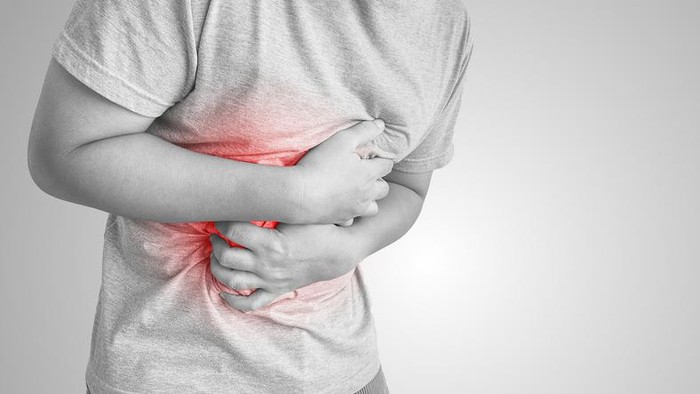
Have you ever heard the term GERD-anxiety? GERD and anxiety are two different health conditions closely related to some people. Here are the meanings of GERD and anxiety that you need to know.
- GERD (gastroesophageal reflux disease) is a stomach acid reflux into the esophagus that occurs at least once a week. This chronic condition can cause heartburn symptoms, namely pain and a burning sensation in the pit of the heart, chest, and throat.
- Anxiety is the body’s natural response to stress. Anxiety disorder is severe and can last for months, even interfering with daily activities.
Some research suggests that anxiety can make GERD symptoms worse. Anxiety and stress are also considered the contributing factors to GERD in some cases. Based on these findings, GERD and anxiety conditions are often associated.
Causes and symptoms of GERD anxiety
To understand these two concepts separately, let’s look at each explanation about GERD and anxiety.
1. Causes of GERD
GERD is caused by stomach acid rising into the esophagus (esophagus) or gastric acid reflux. This condition can irritate inflammation of the surface of the esophagus.
Several conditions can cause GERD, including:
- Obesity (overweight)
- Hiatus hernia
- Delayed gastric emptying
- Pregnancy
Unhealthy eating habits include eating irregularly, eating large portions at once, sleeping after eating, and consuming fried or fatty foods in excess.
The negative effect of GERD on a person’s quality of life can increase the risk of anxiety and depression. This condition can trap you in a cycle of GERD anxiety that is difficult to break.
2. The link between GERD and anxiety
The following links between GERD and anxiety are summarized based on several studies.
- Anxiety increases symptoms associated with GERD, such as heartburn or heartburn. Stress also makes you more sensitive to GERD symptoms.
- Anxiety and other psychological disorders can affect the movement of the esophageal muscles and reduce pressure on the lower esophageal valve.
- Anxiety can cause prolonged muscle tension and make the stomach muscles tense up and push stomach acid up.
- Severe anxiety can also increase stomach acid production.
3. Symptoms of GERD-anxiety

In GERD and anxiety, some common symptoms appear when they recur, such as:
- Heartburn
- Nauseous
- Stomach ache
- Globus sensation, which is a feeling of a lump or choking in the throat
- Sleep disturbances.
Other symptoms of GERD, such as chest pain, difficulty swallowing, and a sour or bitter taste in the mouth, may also appear.
On the other hand, the symptoms of anxiety that you can experience include:
- Feeling restless or nervous
- Hyperventilation or speedy breathing
- Heart pounding
- Chest tightness or pain
- Excessive worry that is difficult to control
- Feeling as if you are in danger.
When GERD anxiety flares up, you may experience all of these symptoms. You may also experience excessive worrying as if you were about to faint or even fear death.
A study shows that GERD can be a source of anxiety and stress. In addition, GERD sufferers who have symptoms of chest pain tend to have higher levels of depression and anxiety.
Chest pain is often associated with other dangerous diseases at risk of death, such as heart disease. This possibility often makes people with GERD anxiety feel more anxious and restless, making GERD symptoms feel worse.
Overcoming GERD-anxiety

the can make efforts to overcome GERD anxiety medically and non-medically. In addition, the treatment carried out must also be able to improve the physical and mental conditions of sufferers of these two disorders.
1. Medical treatment
Your doctor may combine medications for indigestion and anxiety to treat GERD anxiety. These types of drugs include:
- Antacids
- H2 blocker
- Proton pump inhibitor
- Selective serotonin reuptake inhibitor (SSRI) drugs
- Benzodiazepines
- Serotonin-norepinephrine reuptake inhibitor (SNRI) drugs.
Your doctor may also recommend that you follow psychotherapy to treat this condition through cognitive behavioral therapy.
2. Self-care
Self-care for people with GERD anxiety includes a healthy lifestyle, maintaining eating habits, and calming the mind, such as:
- Consumption of healthy food
- Avoid the types of foods that can trigger gastric acid reflux and heartburn.
- Regularly exercise, even if you only do light exercise such as walking
- Avoid caffeine and alcohol
- Relaxation exercises.
Gastric acid reflux disorders in GERD-anxiety need to be consulted by a doctor because there is a risk of complications. Immediately consult a doctor if you experience shortness of breath and chest pain that radiates to the jaw and arms.



